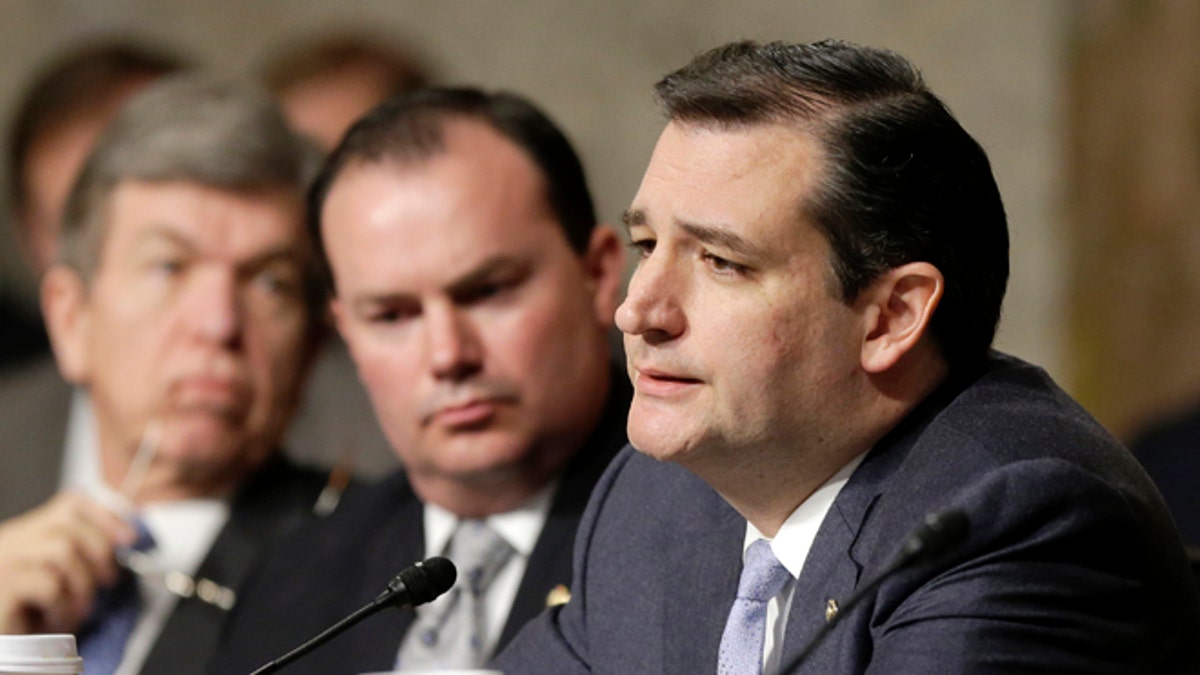
FILE: Jan. 31, 2013: Texas GOP Sen. Ted Cruz on Capitol Hill, in Washington, D.C. (AP)
A proposal by Senate Democrats to limit campaign spending was supposed to die a quick death. But Capitol Hill Republicans are rallying to keep the issue alive in an apparent campaign season strategy, arguing it would put wide-ranging limitations on political free speech by amending the Constitution.
Top Senate Republicans took to the chamber floor Tuesday to make their case, including Texas Sen. Ted Cruz who called the proposal “the most radical” that the upper chamber has considered since he arrived in 2011.
The relatively short proposal essentially say that Congress and states could “regulate and set reasonable limits on the raising and spending of money by candidates and others to influence elections … and may distinguish between natural persons and corporations … by prohibiting such entities from spending money to influence elections.”
However, Republicans argue the proposed constitutional amendment, if passed, would limit the political speech of everything and everybody from the NAACP to movies to little old ladies.
“Its effect would be breathtaking,” Cruz said in a 51-minute floor speech. “It would be the most massive intrusion on civil liberties and expansion of government in modern times.”
“Say you were a little old lady who wants to put a sign in her front yard and write on it ‘I love the First Amendment.’ That takes money,” said Cruz, who also chastised Democrats for not being more concerned about the U.S. economy and the threat of Islamic State militants.
The bill, championed by Senate Majority Leader Harry Reid, has no chance of winning the two-thirds majority to clear the upper chamber, much less being considered by the Republican-run House.
Still, senators voted 79-18 on Monday to keep debating the measure, signaling a GOP strategy of trying to use it against Democrats while also limiting debates on issues that appeal to their voters.
Reid, D-Nevada, and other Democrats across the country have spent months lambasting special-interest campaign spending as being undemocratic, with a special focus on the billionaire Koch brothers, as they try to keep control of the Senate.
Charles and David Koch are industrialists who have contributed large sums to conservative groups that are spending millions against Democratic senators, and the party's candidates have invoked their names in fundraising appeals.
"Should a family hard hit by the recession take a back seat in our government to a couple of billionaires?" Reid said Monday as the Senate returned from its summer recess.
Republicans appear to be in a solid position to win a net total of six seats to take control of the Senate, with Election Day now just eight weeks away.
Their argument that limiting campaign spending by outside groups also violates free speech is similar to the rationale Supreme Court justices have used in decisions diluting decades-old restrictions.
“With all the problems facing the country and the world, the (Senate) majority has decided that the time has come to cut back on the Bill of Rights to be amended for the first time in our history,” Iowa GOP Sen. Chuck Grassley said on the floor Tuesday. “This amendment would put those who would engage in political speech on notice that they may be prosecuted for being active citizens in our democracy.”
Grassley is the top Republican on the Senate Judiciary Committee, which put forth the bill.
Outside groups have spent $189 million on congressional campaigns since January 2013, according to the nonpartisan Center for Responsive Politics, which monitors political spending. That's more than triple the $57 million spent to this point in the 2010 campaign — which, like this year, featured only congressional races and not a presidential contest.
The proposed amendment by Sen. Tom Udall, D-N.M., would let lawmakers roll back the Supreme Court's 1976 Buckley v. Valeo decision, which found that limiting campaign spending by outside groups would violate their free speech.
The legislation would also let Congress address two other cases that have eroded campaign finance strictures: The 2010 Citizens United case, which allowed unfettered independent spending by corporations and unions, and last April's McCutcheon ruling letting wealthy individuals contribute to as many candidates as they'd like.
The proposed amendment includes a provision taking special aim at corporations, saying Congress could bar them "and other artificial entities created by law" from spending money on elections.
Cruz argued that in addition to the NAACP such largely pro-Democrat groups as the ACLU and the Sierra Club are also corporations.
Utah GOP Sen. Orrin Hatch, also a member of the Senate Judiciary Committee, on the Senate floor Tuesday urged Americans to read the proposal.
“Just read it.” he said“My liberal friends may want to paint certain billionaires or for-profit corporations as the Big Bad Wolf, but this proposal goes far beyond that.”
The Associated Press contributed to this report.




